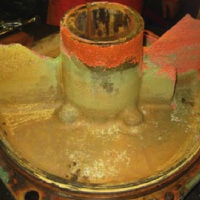 Artesis has completed an installation trial of its Motor Condition Monitoring (MCM) technology for BP Shipping, the global centre of marine expertise for the BP Group; fitting two MCM units to two seawater pumps aboard a LNG carrier.
Artesis has completed an installation trial of its Motor Condition Monitoring (MCM) technology for BP Shipping, the global centre of marine expertise for the BP Group; fitting two MCM units to two seawater pumps aboard a LNG carrier.
Aim
“As with all new technology in the marketplace there is a degree of scepticism when embarking on an initial R&D and trial period. To prove a useful and worthwhile tool we needed to determine whether the MCM unit could accurately detect a fault prior to catastrophic failure and ultimately, provide us with a non-intrusive monitoring process with cost saving benefi ts,” said Mark Pellow, engineering superintendent for BP Shipping.
In addition, the trial aimed to validate the Artesis condition monitoring application technique when compared to the more traditional technique of vibration monitoring.
BP Shipping – Worldwide Fleet With over 50 ships in its worldwide fleet, BP Shipping is very much aware of the benefi ts of condition monitoring and runs a successful global initiative, adopting CM technologies and programmes throughout its fl eet. MCM has the ability to monitor equipment that is currently outside of the BP CM programme, where kit may be inaccessible or in a hazardous location.
With a range of ships including crude and product carriers, shuttle tankers, LNG, LPG and hydrocarbon carriers, lubricant oil barges and off shore support vessels, BP Shipping uses a ‘risk toolbox’ concept, applying a range of tools for identifying, prioritising, benchmarking, quantifying, mapping and controlling risks, this includes the risk of failure and costly downtime.
Following his introduction to Artesis through an internal recommendation, the subsequent reading of articles in the engineering press and meeting the team at an industry event early last year, Mark Pellow, engineering superintendent for BP Shipping was keen to explore the capabilities and deliverables of the MCM system.
Rising To The Challenge
“Having met with Artesis, it was agreed that our validation trial would run up to the point where a specific failure was predicted and maintenance recommended, so that the prediction could be compared with the subsequent maintenance report. The units were then installed by ship power specialist, Wartsila,” said Mark.
“Over the next few months the Artesis team provided excellent support, particularly during the commissioning phase where various software communication issues were encountered”, continued Mark.
Assessment & Informative Maintenance Report
Artesis carried out initial assessments with early reports indicating that both pumps were being aff ected by rubs, misalignment and impeller related issues. The monitoring specialists then predicted that rubs and impeller effects would get worse as the pump eroded and that performance would decrease as the erosion advanced. This analysis process also allowed the team to use power factor and kW as a simple indicator of the pumping performance and condition of the parts susceptible to erosion.
Delivering a succinct and informative maintenance report at the end of the trial, Artesis stated that there was impeller related erosion; signs of wear ring damage and a loss of performance consistent with a hole in the case.
The subsequent replacement of these helped return the effi ciency of the pump to normal. It was also reported that fixing the hole in the casing where the retaining grub screw for the wear ring sits saved the pump casing.
The erosion detected by MCM was to the pump casing fins. These suff ered a heavy loss of material during the trial and it was advised that these should be repaired but this was not essential for the operation. No damage was recorded to either the rotor or stator of the drive motor and none was suggested from the trial data.
Remote on-line indication
“The online system monitoring was the most benefi cial part of the trial process. Using a simple traffic light system to identify that a fault exists, when and where appropriate, allowed for intrusive investigations and repair before failure. This remote on-line indication has enabled a reduction in maintenance man-hours and downtime.
The MCM units has the potential to save on spares and we are continuing to evaluate the functionality of Artesis in various applications within the BPS fl eet,” concluded Mark.
Comment From Artesis
“Off ering a good mix of specifi c mechanical and electrical fault information, we have also been able to give support for torsional energy transfer, something that was unlikely to be detected as a fault by vibration technology.
Since completion of the trial we have been able to set performance limits for this type of seawater pump, based on the data collected, giving us a baseline shape, levels, a power factor and harmonics. This has also allowed us to establish similar simple assessment criteria for other equipment types included within the fleet and utilise this information in our continued BPS fleet condition monitoring assessment programme.”
Joe Barnes,
UK sales manager – Artesis
For further information, please visit http://www.artesis.com



